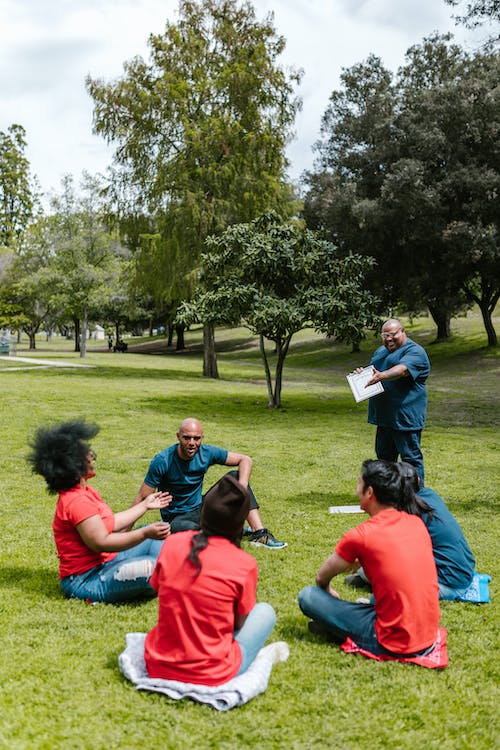Introduction
Charade is an ideal party activity that can be played whenever, wherever, with anyone, of any age, with no complicated rules or complicated games equipment required to start the fun. You only need a few buddies and creative words and phrases to act out. A few scraps of paper, some writing pen, and a little acting skill are all you need to have a fun-filled party. If you need help developing original charades ideas for your group to act out, read on for some advice.
What is a Charade?
Charades is a game where you act out a secret word or phrase while the rest of your group tries to guess what it is. Clues can range from places to persons to more abstract notions. Charade is a typical word-guessing game that mimics or acts out a word or phrase without any spoken language. It is frequently performed at social events, parties, or just for fun.
Commonly, two teams are playing in the game. The “actor” is one team member who selects a word or phrase to communicate to their team using just gestures, body language, and facial expressions. At the same time, the other team tries their best to guess the word or phrase at a given time set and agreed upon by both teams before the start of the game. Depending on the rules agreed on at the game’s onset, no props, writing, drawing, or sound effects are allowed by the performer or the actor.
The game’s objective is for the team to correctly guess as many words or phrases as possible within a given time frame. The team that guesses the most words or phrases correctly wins the game. Charades can be played using various categories, such as movies, books, songs, famous people, animals, or common words. It requires creativity, good nonverbal communication skills, and the ability to interpret non-verbal cues. The game often leads to laughter and excitement as players try deciphering and acting out the clues.
The Origin of Charade
This fun-filled game that we now call a charade started as Pantomimus, a well-liked game in ancient Greece centuries ago. In Pantomimus, a single performer portrayed a story or narrative through gestures and movements. While the modern version of charades first appeared in France in the 18th century and spread throughout Europe in the 19th century. The French word “charade,” which means a riddle or enigma, is where the word “charade” originates.
During the Victorian era in England, charades rose in popularity among the higher classes as a social game. It offered entertainment requiring wit, acting talent, and innovation. The game was frequently played during social, with players taking turns acting out words or phrases while the others tried to guess them. Early in the 20th century, charades gained popularity in the United States as a game to play at social gatherings, family events, and parties. The game kept changing and adapting to new environments as time changed, frequently combining additional categories and themes to make it more exciting and challenging.
With the development of television and film, charades entered the mainstream. It became a mainstay of television programs like “The Tonight Show Starring Johnny Carson,” when celebrity guests would play charades with the presenter and the audience. It was also used in game shows. In the Philippines, a variation of the game called Pinoy Henyo has become a household term. At present, charades continue to be a popular party game that appeals to individuals of all ages. Online versions and mobile apps have made it possible for people to play charades independently or with friends and family from different in the digital age. Charades’ ongoing popularity stems from its capacity to foster camaraderie, promote imagination and creativity, and offer a fun and engaging means of nonverbal and verbal communication.
Game Rules of Charade
Suppose you have space to assemble and move about a little. In that case, you can play the simple and entertaining game of charades with individuals of any age. Make sure you have the following items on hand before you begin the fun: a stopwatch or other timing device, a notepad and pencil for keeping score, blank slips of paper on which you will write the words or phrases that will be used for the game, and two baskets or other containers for the strips of paper with secret words or phrases, one for the secret words and the other for the guessed words. If you already have these things, follow the following step-by-step instructions for playing this thrilling game.
- The participants will be divided into two or more teams. There should be an equal number of players on each team. The two groups divide the number of secret words and phrases equally. Assign a scorer and a timekeeper, who is a neutral person, or choose players from each team to take turns. Decide how many rounds will be played.
- Prepare the secret words before the start of the game. Make a collection of phrases or words to use in the game. Each team can have the freedom to build their own secret words and let the groups break into different rooms to brainstorm sentences to write on their sheets of paper. These words could be quotes or the names of books, movies, plays, TV series, or songs. The teams return to the same room after composing their phrases.
- Set the game’s guidelines before the game start; the rules should be discussed and agreed upon. Establish parameters such as the time allotted for each round, the number of words or phrases included, and whether utilizing props or acting out sounds is permitted. Additional rules may include: the team should only write down a phrase if at least three team members have heard of it; no term should be longer than seven words; no phrase should consist solely of a proper name. For example, it should also contain other words, and no foreign terms are allowed.
- Each team member takes turns playing the actor’s role while the other members guess the secret word based on the actor’s action. The actor overseas uses their body, facial expressions, and gestures to communicate the word or phrase to their colleagues.
- The first actor chooses a clue from the prepared list without verbally sharing it with their team to start the round. While the rest of the team tries to figure it out, they start acting out the hint.
- As the actor continues to perform the clue, the team members will continue to call out their guesses. The team that guesses the right term at the given allotted time receives a point, while no points will be given if the team cannot guess in the allotted time.
- After each round, the next member of the team assumes the actor’s role, and the previous actor joins the team guessing the term. This makes sure that everyone has a chance to act and make a guess.
- As the game progresses, the scorer keeps tabs on each team’s score. The winning team has the most points at the end of the specified rounds or allotted time.
As you enjoy your charade game, remember that just like other games, charade rules may vary depending on what the group has agreed upon and the player’s preference or the influence of specific regional traditions where the game is played. The main goal should be to give every player a positive and inclusive experience.
Word Ideas for the Next Game of Charade
Having a wide range of word suggestions when playing charades can make the game more exciting and challenging. Here are some categories and word suggestions for your upcoming game of charades:
1. Movies and TV Shows
Pick well-known films or TV series that can be acted out. Examples include “Jurassic Park,” “Friends,” “Harry Potter,” “The Lion King,” “Game of Thrones,” and “The Avengers.” Try acting out these famous Disney words and titles when playing with children or Disney movie fanatics. The Lion King, “Let it Go!” Bambi, “Drink Me,” Lady and the Tramp, “On a magic carpet ride,” “Hakuna Matata,” The Little Mermaid, “A Spoonful of sugar helps the medicine go down,” and Cinderella is just a few suggestions.
2. Books and Classic Stories
Choosing well-known book titles or literary characters can also be the ideal material for an exciting charade. Try acting out “Pride and Prejudice,” “Alice in Wonderland,” “Sherlock Holmes,” “The Great Gatsby,” or “Harry Potter and the Sorcerer’s Stone” Feel free to review your classic book and story collection for an additional idea.
3. Songs Titles and Music Related words and phrases
Picking famous songs and acting them out through gestures and movements is also a fun way to consider just as “Bohemian Rhapsody” by Queen, “Thriller” by Michael Jackson, “Hotel California” by Eagles, “Imagine” by John Lennon, or “Hey Jude” by The Beatles. Try copying the traits and mannerisms of these famous singers, songwriters, instruments, and songs to turn your game of charades into a comical pantomimed concert. Here are a few examples that you can do Elvis, Taylor Swift, One Direction, Michael Jackson, rock stars, drums, “Shout!”, Rolling Stones, “Singin’ in the Rain,” “The hills are alive, with the sound of music,” Britney Spears, “No Woman, No Cry,” James Taylor, go back memory lane as you recall the song that been part of your every hurrahs and heartbreaks and tries including them in your next charade.
4. Sports and Activities
Including different sports or physical activities in your charade is also a great idea; if you are playing with kids, these terms will give them an idea of what supports to venture into. Examples of sports terms that you can explore include soccer, swimming, basketball, yoga, surfing, or skiing. Some of these exciting charades sports topics are easy. At the same time, other terms will make you think twice; you may also include Archery, Figure skating, Hockey, Baseball, Croquet, Golf, Horseback riding, Cheerleading, Football, Darts, Roller derby, Table tennis, and Handball, however, make sure you balance the sports term with those that are familiar and quite complicated to avoid frustration.
5. Famous People
Including well-known personalities from various fields is always an exciting idea to be included in your game. Portraying actors, musicians, politicians, or historical figures can be both hilarious and challenging. Some options include Albert Einstein, Marilyn Monroe, Beyoncé, Abraham Lincoln, and Elvis Presley.
6. Animals
If you are playing with kids selecting different animals that can be mimicked through gestures and body language bring extra fun to the game. You may act out a lion, elephant, monkey, giraffe, or penguin. For adult players, you may take a walk on the wild side and act out some common and not-so-common animals, such as whales, snakes, elephants, giraffes, dogs, cats, ants, rabbits, groundhogs, hyenas, kangaroos, sharks, fish, polar bear, caterpillar, cockroach, ram, monkey, jaguar, and rooster. The jungle is full of animals not mentioned in the list, so feel free to explore and include other animals to add fun to your game.
7. Professions
Portraying different occupations or job titles in a charade can be a humbling and exciting addition to the game. Try acting out a doctor, firefighter, chef, teacher, or astronaut, do not limit the choices to blue collared jobs alone; try including also works such as street sweeper, vendor, plumber, electrician, and others.
8. Everyday Actions and Things
Acting out common action words that people do in their daily lives can be easy for adults, but it would serve as a good reminder for kids. Examples include brushing your teeth, taking a shower, cooking, dancing, or driving a car. Suppose you are playing with kids or people who haven’t played charades before. In that case, these words can be easy, fun-for-all games such as airplane, boat, baby, ears, scissors, cough, cold, phone, laugh, blink, hairbrush, sneeze, spin, hammer, book, phone, toothbrush, jump, clap, slap and many more other common words.
9. Superheroes
Kids would be exhilarated to act out their popular superheroes from comic books or movies, while it can be a trip down memory lane for adults. Act out characters like Spider-Man, Batman, Wonder Woman, Superman, Black Widow, and many others.
10. Historical Events
Reviewing the history lessons of your kids can be done by selecting significant historical events. Your kids will surely ace their following history quiz by acting out the moon landing, signing the Declaration of Independence, the fall of the Berlin Wall, the Boston Tea Party, and other significant historical events shaping our history.
With these word and phrase suggestions, you may spice up your charades game and add appeal to all the players’ interests and skill levels. To keep the game interesting and fun for everyone, feel free to combine categories or come up with your own special collection of terms.
Different Game Variations of Charade
The game of charades is adaptable and can be played in various ways. Here are some creative ways to improve and modify the classic game of charades:
1. Reverse Charades
Instead of one person acting out the clue, the entire team acts out the clues in this variation while a member of the opposing team makes an educated guess. This gives the conventional format a playful and cooperative touch. With this variation, the game is turned 180 degrees rather than having just one player act out the statement. Three or more people will goof around before you as they attempt to play out the phrase in unison, leaving you to make your guesses. The harder it becomes, the more people there are acting out the term or title.
2. Speed Charades
For this variation, the timer is another element that adds challenge to the game. To speed up the game, the timer is set for a shorter period, such as 30 seconds or 1 minute. A sense of urgency and excitement is added by the requirement that players act out and predict as many clues as they can in the specified time.
3. Picture Charades
Players utilize visual aids like flashcards or photos or draw clues on paper instead of acting out words or sentences. This modification makes the game more imaginative and visually appealing by fusing Pictionary and charades aspects.
4. Silent Charades
Players in this variation act out the clues without speaking. However, they may utilize objects or written hints. Players must only rely on physical signals and visual clues; as a result, changing the game’s dynamic.
5. Partner Charades
Create small groups or pairs and assign one member to each team to play out the clue while the other group members try to guess. This variant promotes cooperation and working in teams. The only thing more challenging than trying to imitate the word “potato” is maintaining your composure while your companion is doing it. The results of partner charades vary. Play two against two with a partner, or have them perform the word as you guess. Whoever correctly guesses the most words in the least amount of time wins.
Remember that there are countless other alternatives that you can try that will fit your preferences and the players’ preferences; feel free to combine or modify different variations. The aim of the game is to enjoy yourself, promote inventiveness, and maintain interest throughout the game.
Hand Gestures and Signals for Charade
Professional charades have created a code for the fundamental charade hints. You can indicate the word’s pronunciation, the number of words, the number of syllables, the type of category, and more with these gestures. Here are some common Charades categories and the actions that go along with them.
- Sounds like – To signify that a term sounds like the action or object of the secret word, cup your hand over your ear.
- Number of syllables – Put the number of fingers corresponding to the syllables on your forearm.
- Number of words – Holding the same number of fingers in the air indicates the phrase’s word count. Show two fingers for the second word, then act out the word.
- Past tense – Extend your thumb over your shoulder to demonstrate that the action has already occurred or past tense already.
- Tell your team that they’re getting off base – Hugging yourself will make it appear as though you are shivering, which will alert them that their assumptions are far from the secret word.
- Tell your team that they’re close to the word – Act as if you are terribly in heat. This will give a message to your team that while they are near the word, they are offering an accurate guess.
- You’re right – To demonstrate that this was a successful word guess, tap your nose with your index finger and point at the correct guesser.
Charades Category Actions
Charades have a wide range of categories to choose from, each with its own set of motions and gestures. The actions used to transmit the cues can differ dramatically depending on whether you are acting out a scene from a movie, imitating a famous person, or portraying an animal. It can be humorous and challenging to communicate with our body actions.
- Movie – Act like a movie is being played from a reel on a vintage projector. With one hand, pretend to be the projector, and with the other, pretend to be winding up the projector.
- TV Show – Create a rectangle by tracing the shape of a television screen.
- Book – Make a book opening gesture. Put your palms together and lay your hands flat to form a closed book. Next, raise your palms as if a book were about to open.
- Song – Pretend you are singing using your hand as a microphone.
- Quote or phrase – Sign quotation or “ditto” marks in the air using your index and middle fingers on each hand.
- Person – Place your hands on your hips and look off into the distance with your chin raised like a hero!
- Action – ‘Walk’ your two fingers of one hand across the palm of your other hand.
Conclusion
The popular and enjoyable game of charade has endured the test of time. Despite having centuries-old origins, it has developed into a game that people of many ages and backgrounds enjoy. Charade is an excellent approach to bringing people together and promoting a lively and engaging environment since it mixes creativity, communication abilities, and collaboration. The simplicity of the game adds to its appeal. Players are forced to use their wits and non-verbal cues as they act out words and sentences without vocal communication. Charades generate laughter, excitement, and friendly competition as players try to interpret the clues and correctly predict.
Additionally, charades provide countless opportunities for personalization and modification. Players can customize the game to their preferences and the interests of their group by adding themed rounds and original hand motions. The word concepts and gestures can be altered to fit the knowledge and creativity of the participants, whether they are talking about famous persons, old movie names, or commonplace actions. Charades remain a timeless classic that enhances gatherings, parties, and family get-togethers with happiness, laughter, and connection. It offers a venue for enjoyable and shared experiences while fostering creativity, communication, and teamwork. So assemble your friends, family, or coworkers and start playing charades to create beautiful memories for everyone.







